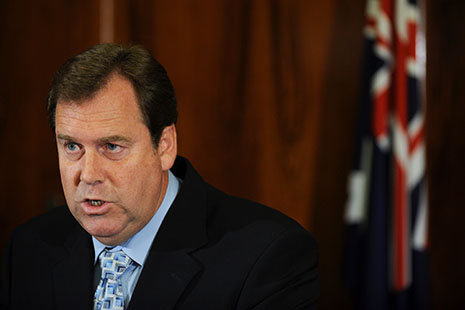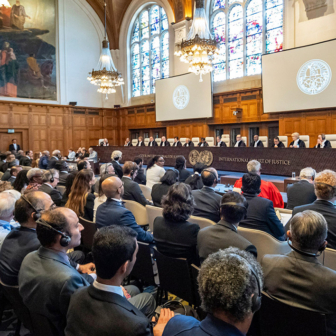WITH THE RELEASE last week of its vast discussion paper on amendments to national security legislation, the Rudd government has finally got around to reforming Australia’s terrorism laws. In opposition, Labor couldn’t win a trick on national security and was strongly out-polled on the issue by the Coalition. So how should it proceed now it is in the driver’s seat?
According to the attorney-general, Robert McClelland, these proposals reflect the need to lock down a long-term and sustainable scheme of national security laws. He cites the fact that substantial portions of the Howard government’s laws will expire of their own accord under sunset clauses limiting their life to ten years. It’s odd, then, that the paper contains no proposals to amend the two most controversial parts of the Criminal Code subject to the sunset clauses – those enabling control orders and preventative detention orders to restrict people’s liberty.
Instead, the government’s main focus is on the less exotic aspects of terrorism policing – the crimes themselves, the power to hold suspects before charging them and the management of prosecutions where information prejudicial to national security might be disclosed during trial. While much of this involves amending the laws enacted under the Coalition government, there are some entirely original, and rather surprising, measures in the package.
All of which makes the media’s resort to the tired old labels that dominated the security debates of the Howard era a bit dispiriting. At the same time as the Australian announced with incredulity that McClelland had “moved to soften elements of Australia’s counter-terrorism laws, barely a week after police raided a cell of suspected Somali and Lebanese extremists in Melbourne,” the ABC’s Kerry O’Brien began his interview with the attorney-general by asserting that the government was “seeking to toughen up anti-terrorism laws that are already quite draconian.” At least Radio National’s Fran Kelly admitted that clarity either way was elusive when she began her conversation with the minister by confessing: “I’m a little confused, do they tighten or soften the terrorism laws?”
As Wayne Swan might say, it’s the wrong question. Apart from being an unhelpful way to approach a discussion paper which runs (including draft legislative provisions) to over 400 pages, talk of “tough” or “soft” laws is not really to the point. What the public is entitled to expect is that the government will enact effective laws.
What this means is that the police and other agencies should have the legal framework they lets them do their job of protecting the community but ensures they go no further than that. Certainly, we should resist laws that actually contribute to the problem – frequently announced with swaggering bravado as “tough on terrorism” – regardless of any superficial appeal they may hold. Even with the best of intentions, governments can overreach in their responses to the threat of political violence. Laws expressed in very broad terms and subject to too few controls do not assist police and other agencies in their difficult task. Instead, they all too easily lead to error – which can be expensive both in terms of misdirected time and manpower and for the liberties of individuals wrongly targeted.
Laws are clearly counter-productive if they serve very little operational purpose but fan fears in communities that already feel they have been singled out for discriminatory treatment. Although Australia’s anti-terrorism laws are expressed in neutral language, independent and parliamentary inquiries have found that some provisions have the potential to alienate the very communities with which we need to work in rooting out extremists and thwarting conspiracies to commit mass violence. The crime of “association” with a terrorist organisation has been repeatedly mentioned in this regard. Yet even though it has never been used to charge an individual and would likely prove most unwieldy in evidential terms, this offence is left untouched by the McClelland proposals.
This example indicates the main problem with the attorney-general’s discussion paper – its fundamentally reactive character. In seeking to respond to the many (and occasionally diverse) recommendations of no fewer than four major government and parliamentary reviews between 2006 and 2008, Mr McClelland has lost sight of the wood for the trees. This is not to say the trees are not important – in this area the devil is generally in the detail. And we should remember, too, that McClelland's predecessor, Phillip Ruddock, was breezily dismissive of virtually any suggested changes to the laws, even when they were put up with bipartisan support. The long overdue implementation of many of these inquiry recommendations is welcome but, even so, it is fair to say that the government has largely been captured by the agenda set by its predecessor.
This is reflected in the failure to seize the opportunity to recast the laws to match the government’s objective of “public confidence in the operation of the national security legislation framework.” What that would require, if we were really to do the job properly, would be to look with fresh eyes not only at the dubious categorisation of various crimes as “terrorism” but at also those mechanisms in the law which demonstrably privilege the power of the state in areas where individuals should worry most about intrusion.
A small but nonetheless important example is the decision of the attorney-general not to scale back his personal discretion to proscribe an organisation on the basis that it (or presumably any of its members) “praises” some terrorist incident, in cases where a person, regardless of actual or mental age, might be encouraged to engage in a terrorist act of their own. This basis for proscription exists alongside the far more justifiable grounds of “urging” or “instructing” others to commit a terrorist act, and “praise” is a very ambiguous term in comparison. It is not hard to imagine that bodies which refer approvingly to the activities of the leaders of national liberation movements – say, Mandela or Gandhi – could conceivably fall foul of the law. In 2006 the Security Legislation Review Committee recommended that this aspect of the proscription regime should be repealed, given its vagueness and the “chilling” effect it is likely to have on free speech. But while McClelland has agreed that the risk of the listener acting after hearing the “praise” must be “substantial,” that’s as far as his amendment goes.
This is in keeping with the tendency of the government to keep step with the lowest common denominator of the various review panel recommendations when these involve a rollback of the existing laws. Placing a seven-day cap on the pre-charge detention of a terrorism suspect is a particularly controversial instance. This power sustained Mohamed Haneef’s ongoing detention while the Federal Police pursued their ultimately baseless case against him. The Clarke Inquiry into that affair favoured a limit being put on the length of detention but was non-committal about what it should be. Acknowledging that it had received a range of opinion on the matter, John Clarke QC declared that whatever was settled upon, seven days should be the upper limit. It is not surprising, then, to see the government peg the duration of pre-charge detention on that marker, even though experience to date seems to indicate that this window seems far bigger than necessary. It is ironic that the only real use of these provisions in the Crimes Act was to deprive an innocent man of his liberty for twelve days. For those who have gone on to be convicted of terrorism crimes, the police did not require any special extension of the detention time before laying charges.
The attorney-general’s approach appears different, though, when a possible extension of the laws has been suggested. Among these, the one that has received the most attention has been the proposal to broaden the definition of “terrorist act” beyond “physical harm” to take in the psychological damage caused by a terrorist attack. This change was recommended by the Security Legislation Review Committee in 2006 but the subsequent Parliamentary Joint Committee on Intelligence and Security report did not share its view. A good case can be made for including damage in all the forms that the law recognises more generally when criminalising terrorism. The primary aim of terrorism is to instil fear in the community – in that sense, we are all intended victims. Usually the lives of some individuals are used by extremists to this end, but it is appropriate that the law recognises the wider harm intended and inflicted by those who peddle political violence.
As a matter of practical application, very little is likely to turn on this expansion of the harm element because, ideally, plots will be foiled and charges laid in connection with the preparatory stages of a terrorist plan. This has been the case in the operation of the laws to date and prosecutions have been successful even though the “harm” has not come to fruition. Were a plot to progress to execution, it seems very likely that some physical harm (bearing in mind that the definition currently includes property damage regardless of any casualties) would result. But it is not totally inconceivable that an act of terrorism – a thwarted hostage-taking, for example – could occur without physical harm to victims.
The merits of the change aside, the decision on this issue can be seen as part of a discernible pattern underlying the attorney-general’s choice between conflicting recommendations. Any proposals that might be seen as too ameliorative (or, to be crude, “soft”) were passed over while those of an expansive nature tended to be picked up.
THEN THERE are the areas in which the attorney-general has gone it alone. The most unsatisfactory of these is his decision to keep the “threat of terrorism” within the definition of a “terrorist act” rather than house it as a separate offence – despite a clear consensus for change among the various inquiries. The discussion paper argues that creating a separate offence somehow “dilutes the policy focus” of criminalising “threat of action.” But how exactly is illegal activity diminished by being the subject of a separate offence provision in the strictest division of the Criminal Code?
The government goes on to propose broadening that section by including activity not just that “causes” harm but also is “likely to cause” harm. This is a far more worrying expansion of the definition than the inclusion of psychological harm and one which makes the entirety of the laws far more malleable in their application.
Other expansions of the powers of the state are far more obvious. The new police power to enter premises without a warrant in “emergency situations” deserves to attract fierce debate, with the onus on the government to explain why this extraordinary extension is necessary given that the police have conducted a number of operations to date without any evidence that they’ve been impeded by the need to obtain warrants. Even the apparently positive step of empowering the government to declare which regional aid organisations people may safely deal with (notably in giving or receiving some form of training in, say, medicine or construction) is an example of this. While providing clarity to Australians, there is no doubt that this will significantly broaden the power of the executive by enabling it to receive and determine applications from organisations seeking to show they have no links to terrorist movements.
CONSIDERED AS A WHOLE, this suite of proposals from the government is marked by its determination not to travel too far from the Ruddock era. Certainly the many specific amendments and clarifications to overcome long-recognised deficiencies or ambiguities in existing provisions are welcome. But in aiming to finish the job the Howard government started, the government has not paid enough attention to broader questions about how best to criminalise political violence and the extent to which a departure from accepted norms is justified in the investigation and prosecution of offences. By retaining merely symbolic aspects of the laws and continuing to privilege the role of executive discretion in the operation of other parts, Labor shows a reluctance to think creatively.
That said, no assessment of the discussion paper is complete without acknowledging the great efforts the attorney-general has made to break with the tone of past debates about counter-terrorism laws. On this score, the government deserves high praise. The tendency of the Howard government to ambush the parliament with a succession of anti-terrorism measures, restrict opportunities for public input in Senate committees and ram laws through with histrionic cries of urgency seems a world away from the present exercise. That the present government has chosen to move ahead with reform in this area in a spirit of broad consultation rather than community fear – even in light of recent attacks in Jakarta and arrests in Melbourne – is impressive.
But it would have been good to see the same amount of courage and principle brought to the substance of many of the proposals. •




